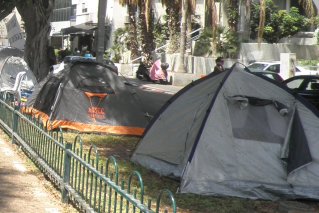
Directive 834 requires permit for all expression in public sphere; District Court Judge likely to dismiss petition against municipality.
Ahead of court proceedings on the legality of its requirements for permits, the Tel Aviv municipality revealed a shocking directive conditioning “demonstrations, rallies, ceremonies, solidarity events, charity events, holiday events, and all other activities that express an idea, opinion, value, belief, or worldview” on the obtainment of a permit from the municipality.
The document, called Directive 834, was produced by the municipality in advance of this morning’s hearing in the Tel Aviv District Court on the petition of five social protest activists and the Association for Civil Rights in Israel (ACRI) against the Tel Aviv municipality’s policy of prohibiting protest tents without a prior permit. The petition details the onerous bureaucratic requirements recently instituted by the city and argues that these burdens constitute an unconstitutional barrier to the freedom of expression and protest. Although the court did not reach a decision today, Judge Tzila Tzfat declared at the outset of the hearing that she thinks the petition should be denied.
ACRI Attorney Sharona Eliahu Chai, who filed the petition, said: “We were amazed to read the response of the municipality, which treats the streets as its private property. The Tel Aviv municipality is trying, in absolute violation of the law, to make itself the reigning authority for permitting protest activities. Onerous bureaucracy, especially when accompanied by the imposition of considerable expense, is a proven means for suppressing protests. The municipality’s conduct vis-à-vis the petitioners indicates that it is selectively enforcing its policies, using bureaucracy to silence ‘problematic’ protests.”
Under Directive 834, the conditions for granting a permit include, among other things, payment of “reimbursement” to the municipality, a security deposit, and proof of an insurance policy. Whoever does not act in compliance with the municipality can expect to be punished severely and immediately – with fines, confiscation of equipment, and brutal removal of their tent or equipment, without recourse if the tent or equipment is rendered unusable.
The petition filed in the District Court details the trials of one of the petitioners, the activist Tamir Hajaj, who sought to erect a protest tent in Rabin Square in Tel Aviv. After the tent he pitched was dismantled by city inspectors on the grounds that it was not licensed, Hajaj tried to obtain a permit to re-erect the tent. He was transferred from one office to another, until finally being asked to submit an application detailing the objective of the tent, its size and location, and how long he planned for it to stand. After he furnished these details, he was required to apply for a business license, a police permit, and a fire department permit. In order to obtain the police permit, he needed approval from a safety engineer, an electrician, and Magen David Adom, and a commitment to place a security guard on the premises. The fire department permit required proof that the tent met the requirements of the Standards Institution of Israel.
Aside from all these requirements, the municipality permitted the tent for only 9 days (and not the 45 requested) and forbade sleeping in the tent or including a sitting area. This differed from the permits granted to other tents pitched in the city, which received permits for long periods of time and included accommodation for equipment for the living needs for the activists.
The magnanimous treatment afforded by the municipality to the protest tent established in Wolosky Park (far from the city’s main public sphere) – including chemical toilets, water faucets, garbage areas and lighting, and not requiring a business license or fire department permit – raises a suspicion that the municipality is attempting to move the protest to outlying areas far from the public eye and the heart of the city.








Pingback: SALBE: In Israel, the language in which you read dictates what you know 19Jul12 | Australians for Palestine